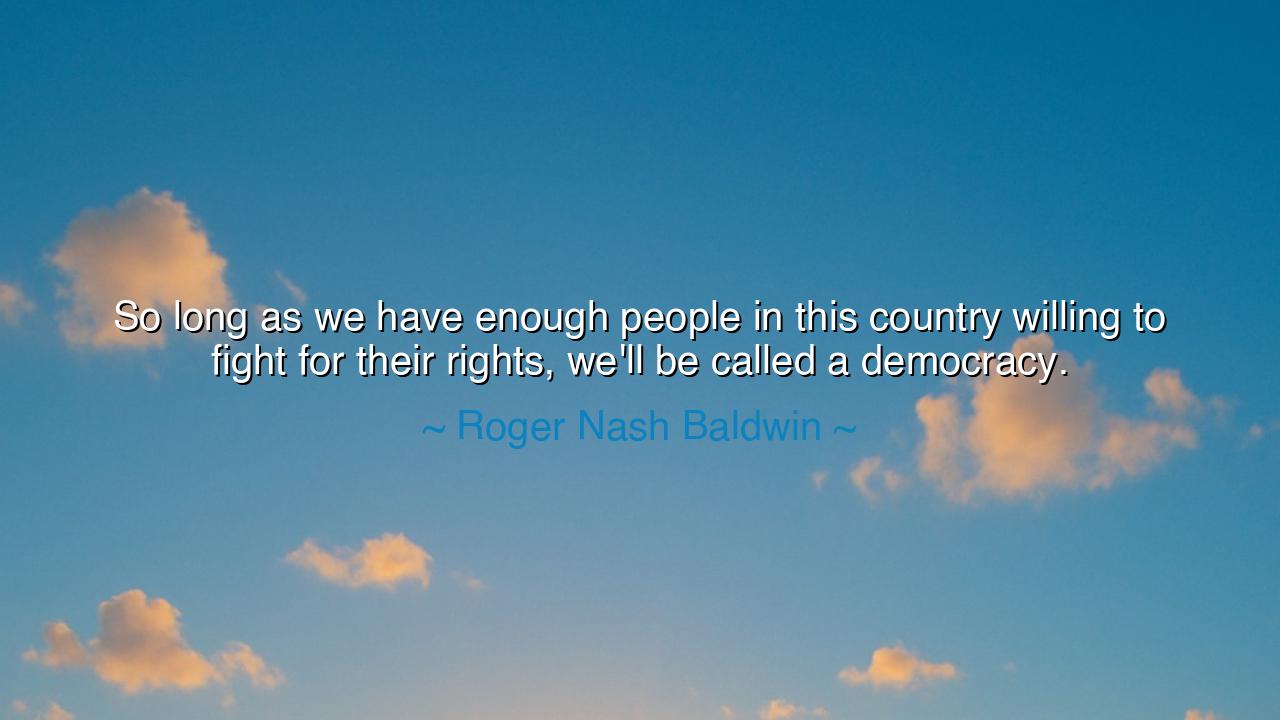
So long as we have enough people in this country willing to
So long as we have enough people in this country willing to fight for their rights, we'll be called a democracy.






The words of Roger Nash Baldwin — “So long as we have enough people in this country willing to fight for their rights, we’ll be called a democracy.” — sound like a trumpet across the ages. They remind us that democracy is not a gift bestowed by rulers, nor a jewel that once won remains forever secure. It is a living covenant, kept alive only by the courage of those who rise, again and again, to defend their rights against erosion, neglect, and tyranny.
The meaning is clear and fierce: democracy is not sustained by parchment and ink, nor by the hollow chanting of words. It is sustained by the will of the people to guard their freedom with vigilance. When the many grow weary or complacent, when they surrender their voice for comfort, then democracy withers, no matter what name the nation still bears. Only where citizens are willing to fight — not always with weapons, but with words, protest, and unyielding conviction — can the spirit of liberty endure.
Baldwin, as founder of the American Civil Liberties Union, spoke from a life devoted to this truth. In an age when dissenters were jailed, radicals silenced, and minorities oppressed, he fought to uphold the right of every person to speak, to believe, and to live without chains. His cry was born of battles in courts and in streets, where he saw that democracy survives only when ordinary people refuse to yield their dignity.
History bears countless witnesses to his wisdom. Recall the Civil Rights Movement of the 1960s, when African Americans marched, bled, and endured jail to demand the simple recognition of their rights. America called itself a democracy before those days, but Baldwin’s words remind us: it was their willingness to fight that gave truth to the name. Without them, democracy would have been no more than a hollow mask hiding injustice.
Let this be the lesson carried forward: a nation is not a democracy because it claims the word, but because its people embody the struggle. Freedom, once won, must be guarded daily, for it is ever besieged by those who seek to weaken it. Baldwin’s words stand as a beacon: rise, speak, resist, and fight — for only then shall your country truly be called a democracy.






TNTran Nguyen
This quote brings up an important point about the active nature of democracy. But can a democracy still be considered a true democracy if people are only fighting for rights when they are under threat? Is democracy truly alive only when people are fighting for justice, or is there a deeper foundation of rights, equality, and participation that should be actively maintained? How can we shift the focus from reactive fights to proactive engagement for the common good?
DDLe Duc Dat
Roger Nash Baldwin’s words are empowering but also raise a deeper question: if democracy relies on people fighting for their rights, what happens when people feel that fighting is futile or dangerous? Does the fight for rights diminish in times of political or social unrest, and what does this mean for the health of a democracy? Are we at risk of letting complacency erode our democratic values, even as we claim to be a democracy?
QKVo Quoc Khanh
This quote makes me think about how active participation is essential for a society to truly be considered democratic. But does this mean that a democracy is only valid when there are consistent struggles for rights? What if there’s complacency or apathy among the population? Can a democracy still thrive in such an environment, or do people have a responsibility to continually challenge the status quo to keep the system in check?
BLNguyen Thi Bich Ly
Baldwin’s quote seems to suggest that democracy isn’t just about the systems in place but about the willingness of the people to stand up for their rights. But what does this mean in practice? Are we truly living in a democracy if only certain groups are fighting for their rights, while others remain passive? How can we ensure that everyone has the opportunity to stand up for their rights, and is that what makes a democracy truly democratic?